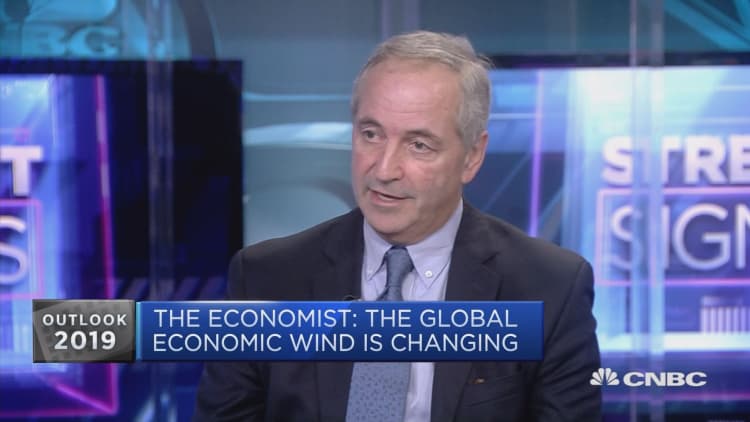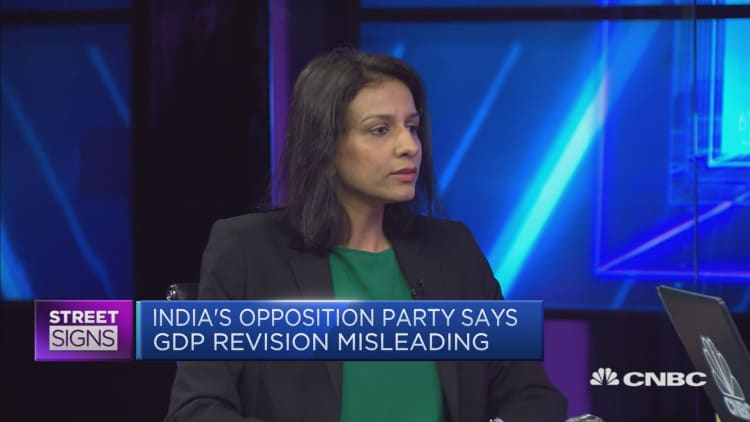Farmer discontent and weak job growth could hurt the performance of Indian Prime Minister Narendra Modi and his ruling Bharatiya Janata Party in state elections. That offers a crucial opportunity for the main opposition party, the Indian National Congress, to shine.
Five states recently went to the polls to elect representatives to their respective assemblies. Votes will be counted on Tuesday, with special attention on the regions of Madhya Pradesh, Chhattisgarh and Rajasthan. The three Hindi-speaking areas boast a combined state domestic product of roughly $305 billion and are among the country's easiest places to do business, according to the World Bank.
Analysts anticipate the outcome in the three states could serve as a preview for the country's general election in 2019.
"The results of these elections, while not conclusive, may serve as bellwethers for whether the nearly 65 parliamentary seats from the electorally important states of Madhya Pradesh, Rajasthan, and Chhattisgarh will ultimately go to the opposition Indian National Congress party or to the BJP in 2019," said Kartikeya Singh, deputy director of the Wadhwani Chair in U.S.-India policy studies at the Center for Strategic and International Studies, in a note.
Concern over farm distress will matter the most.Radhika Raoeconomist at DBS Bank
The three states are traditionally BJP strongholds but that's set to change. According to exit polls by Indian news channel NDTV released on Saturday, Congress is expected to easily win Rajasthan and narrowly emerge victorious in Chhattisgarh. Madhya Pradesh, meanwhile, is seen headed for a hung verdict.
If the right-wing BJP loses two out of the three, it could have a weaker mandate ahead of the all-important 2019 vote. Not having the support of cooperative state governments, those ruled by BJP or an allied party, can diminish the central government's development priorities and reform agenda, according to Singh.
For Congress, gaining heavyweight states such as Rajasthan and Chhattisgarh could embolden its leader Rahul Gandhi, — the son of former Prime Minister Rajiv Gandhi — to form a coalition with other opposition groups for the 2019 polls. Congress "needs to demonstrate that it is still a relevant major party in the lead up to the national elections — something within its grasp with these state elections," Singh said.

The issues at stake
Tougher economic conditions as a result of higher oil prices and a depreciating rupee are set to work against the BJP. India is a heavy energy importer so the combination of a weaker currency and spiking crude prices will be a drag on growth.
But it's rural policies that will be influencing votes in Madhya Pradesh, Rajasthan, and Chhattisgarh, which are all agrarian economies.
Spiking fertilizer costs, declining agricultural commodity prices and weak incomes have sparked a raft of farmer demonstrations and suicides in recent months. In late November, tens of thousands of rural workers marched to parliament in New Delhi in protest against escalating operating costs, dwindling produce prices and insufficient agriculture infrastructure investment.
"Concern over farm distress will matter the most," said Radhika Rao, economist at DBS, Southeast Asia's largest bank. "Social issues like the level of employment, welfare schemes, and caste-based identity politics are also likely to play a hand in swaying the final vote."

The BJP hasn't ignored rural issues. Since coming to power in 2014, Modi's government has launched initiatives to improve irrigation and crop insurance. It's also made campaign promises for farm loan waivers and other welfare handouts but such measures could pressure India's fiscal situation, Rao warned.
"High state fiscal deficits will keep India's general government deficit levels elevated at above 6 percent of GDP this year and FY20 as well," she said.
Looking ahead to 2019
Given Modi's massive popularity, a few minor setbacks in state elections may not hurt his chances of re-election in 2019.
As long as the BJP doesn't suffer too many losses, the prime minister "will remain on course for re-election next year, albeit with a smaller number of seats in parliament," Sasha Riser-Kositsky, senior South Asia analyst at consultancy Eurasia Group, said in a note.
Still, the lack of a parliamentary majority could be challenging.
"Modi would need to contend with coalition politics in a way he has not had to before, and policy-making could slow as he focuses on the pet projects of his alliance partners and avoids difficult reform that they oppose," Riser-Kositsky warned.

